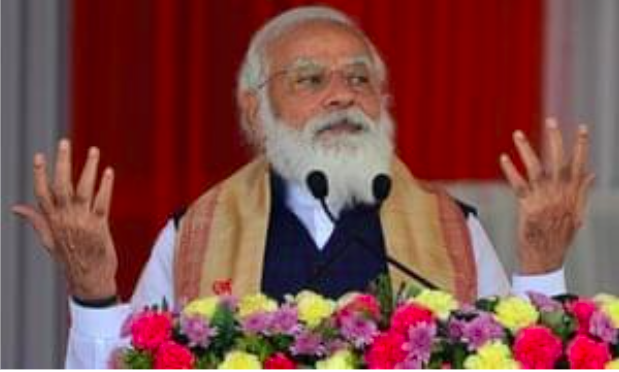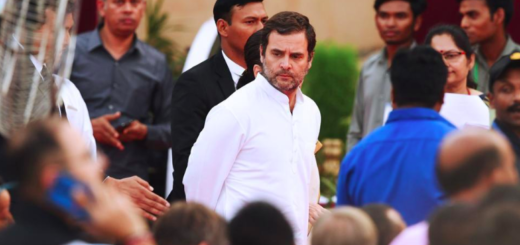A wise man Changes views! Guardian view on India’s farming revolt: a bitter harvest!

Editorial in The Guardian, 2021 Mon 25 Jan 04. There’s a growing backlash against Narendra Modi’s autocratic tendencies and the plutocrat donors who fund his party ‘Mr Modi takes decisions without forewarning and expects them to be rubber-stamped by a pliant legislature.’ Photograph: Biju Boro/AFP/Getty Images.
The Guardan editorial was written on Jan.4 What it predicted about Republic Day, Jan.26 did happen, did come true! That I think is honest objective journalism, speaking truth to Powers that be, with out fear or favour!
To err is Huamn but…
Many Indian dailies as well hinted the same, though not so forth rightly. “Errare humanum est! Sed mutare concilim est sapientis!” (To err is human, but to change one’s views taking inspiration from wise councils is the mark of a wise man!)
We really hope and pray that our PM Modiji is a wise man, and has become wiser especially after what supreme court has said and did to postpone the implementation even for a year. james kottoor editor ccv.
Please read below Guardian view on Farm strike!
Narendra Modi, India’s Hindu nationalist prime minister, has probably never read Lord Hailsham. But maybe he should. The former lord chancellor’s 1976 BBC lecture contains perhaps the most penetrating assessment of parliamentary democracy, of which India is its largest version. Lord Hailsham’s argument carries a constitutional lesson at an opportune moment for Mr Modi.
The Conservative peer warned that Britain risked becoming an “elective dictatorship”. A government’s parliamentary majority is merely tempered by political realities and MPs’ consciences. “Only a revolution, bloody or peacefully contrived, can put an end to the situation,” he said.
Mr Modi swept to victory in elections in 2019. The once-mighty Congress party almost disappeared. No rival party gained enough seats to have its chief named leader of the opposition. The judiciary has been cowed by Mr Modi.
It is no laughing matter when Indian Muslim comedians are jailed for jokes that they have not made. Mr Modi has an autocratic style. He takes decisions without forewarning and expects them to be rubber-stamped by a pliant legislature. Last summer, Mr Modi enacted major farm laws that threaten the livelihoods of two-thirds of India’s 1.3 billion people without discussion, during the Covid lockdown of parliament.
What followed was arguably the largest general strike in history and weeks of unrest. Unless there is a climbdown, farmers will bring the capital to a halt this week, when Mr Modi hopes to be taking the military salute on the country’s Republic Day.
India’s prime minister says that the reforms will benefit farmers. Agriculture needs updating not least because it is fast-depleting the country’s water tables. But Mr Modi blocked parliamentary scrutiny and prevented farmers from raising objections via lawmakers. The supreme court has stepped in, but judges were no honest brokers, setting up a committee to investigate the issue that was dominated by pro-Modi voices.
Unlike the west, democracy came to India before capitalism. Mr Modi appears to think that this was a mistake and that Lord Hailsham’s “elective dictatorship” is needed for India to industrialise. If so, he is sadly mistaken. The new laws aim to regulate the trade of 200 million rural households, and farmers worry that these powers will be exercised on behalf of plutocrats. Who can blame them? Two decades ago, the bottom 50% of the country accounted for 20% of India’s income and the top 1% had 14%. Today, the positions are reversed.
India’s gilded age is shrouded in ironies. About 200 million Indians sleep on an empty stomach while state granaries bulge with cereals, because the government subsidises the procurement of rice and wheat. Yet the poor do not have enough money to buy healthy meals and there is no state-guaranteed food security. India needs politicians who can argue that the country should diversify its agricultural base and mitigate the effects by expanding welfare and creating industries to offer jobs to those displaced from land.
This requires a government interested in ordinary people, not just corporate profits that disproportionately fund Mr Modi’s party. If those left behind by economic change conclude that those in power are not bothered about their plight – or have rigged the system in favour of the better-off – there will be trouble. Under pressure from his ideological svengalis, Mr Modi offered to defer his reforms. This is not enough. He should return, in less peremptory fashion, with fresh proposals to parliament that can be properly scrutinised. Sceptics need convincing with words not threats. If he wants to succeed, Mr Modi must show he can be more democrat than autocrat.

















The comments are very true and accurate . Mr Modi knows very well that the three farm bills were hurriedly drafted,never discussed in detail in the parliament.It was passed due brute majority in the Parliament and obtained the President's approval easily because he was a RSS follower before becoming the President. Now when people started reading the bills in detail they realise the danger and started protesting. Mr Modi considers it a
matter of personal prestige and hence refuse to speak with the farmers. What a tragedy for this country.